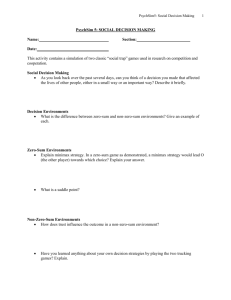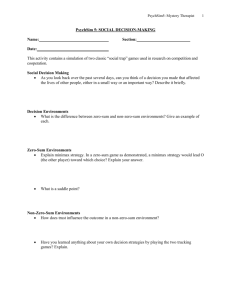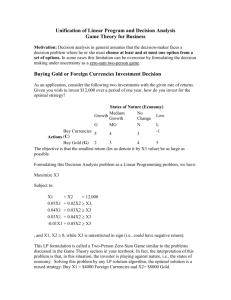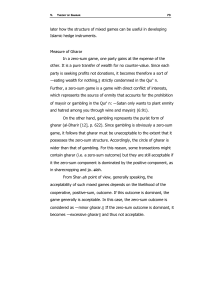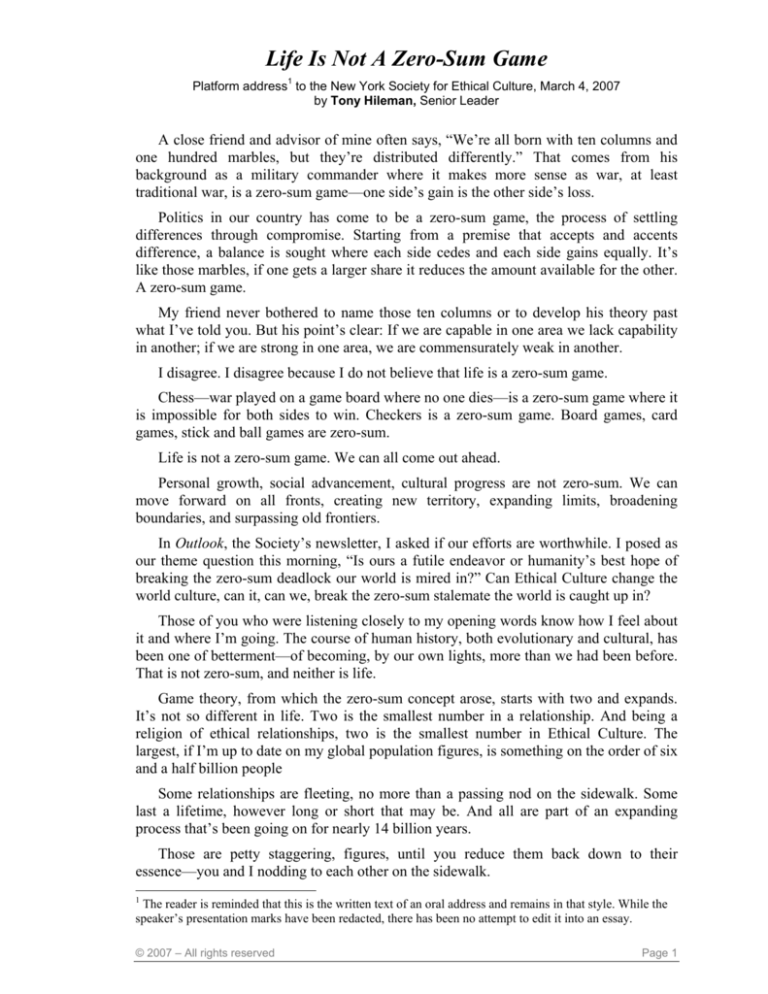
Life Is Not A Zero-Sum Game
Platform address1 to the New York Society for Ethical Culture, March 4, 2007
by Tony Hileman, Senior Leader
A close friend and advisor of mine often says, “We’re all born with ten columns and
one hundred marbles, but they’re distributed differently.” That comes from his
background as a military commander where it makes more sense as war, at least
traditional war, is a zero-sum game—one side’s gain is the other side’s loss.
Politics in our country has come to be a zero-sum game, the process of settling
differences through compromise. Starting from a premise that accepts and accents
difference, a balance is sought where each side cedes and each side gains equally. It’s
like those marbles, if one gets a larger share it reduces the amount available for the other.
A zero-sum game.
My friend never bothered to name those ten columns or to develop his theory past
what I’ve told you. But his point’s clear: If we are capable in one area we lack capability
in another; if we are strong in one area, we are commensurately weak in another.
I disagree. I disagree because I do not believe that life is a zero-sum game.
Chess—war played on a game board where no one dies—is a zero-sum game where it
is impossible for both sides to win. Checkers is a zero-sum game. Board games, card
games, stick and ball games are zero-sum.
Life is not a zero-sum game. We can all come out ahead.
Personal growth, social advancement, cultural progress are not zero-sum. We can
move forward on all fronts, creating new territory, expanding limits, broadening
boundaries, and surpassing old frontiers.
In Outlook, the Society’s newsletter, I asked if our efforts are worthwhile. I posed as
our theme question this morning, “Is ours a futile endeavor or humanity’s best hope of
breaking the zero-sum deadlock our world is mired in?” Can Ethical Culture change the
world culture, can it, can we, break the zero-sum stalemate the world is caught up in?
Those of you who were listening closely to my opening words know how I feel about
it and where I’m going. The course of human history, both evolutionary and cultural, has
been one of betterment—of becoming, by our own lights, more than we had been before.
That is not zero-sum, and neither is life.
Game theory, from which the zero-sum concept arose, starts with two and expands.
It’s not so different in life. Two is the smallest number in a relationship. And being a
religion of ethical relationships, two is the smallest number in Ethical Culture. The
largest, if I’m up to date on my global population figures, is something on the order of six
and a half billion people
Some relationships are fleeting, no more than a passing nod on the sidewalk. Some
last a lifetime, however long or short that may be. And all are part of an expanding
process that’s been going on for nearly 14 billion years.
Those are petty staggering, figures, until you reduce them back down to their
essence—you and I nodding to each other on the sidewalk.
1
The reader is reminded that this is the written text of an oral address and remains in that style. While the
speaker’s presentation marks have been redacted, there has been no attempt to edit it into an essay.
© 2007 – All rights reserved
Page 1
Game theory applies to some very serious things not generally considered games, like
war. But it doesn’t apply to some other things. Take economics, for example. Sure, you
can take a “the rich get rich and the poor get poorer” approach, which is a pretty easy sell
in this era of the millionaire next door, but it’s really not true. In fact the expansion of
material worth is the basis of capitalism, which, despite all its flaws, has proven the most
reliable engine for economic advancement.
Now, before you pillory me, let me explain. Unrestrained capitalism, like
unrestrained democracy, doesn’t work very well. The one favors the few at the expense
of the many, while the other allows the many to abuse the few. Just as democracy needs
constitutional restraints to protect minorities against the tyranny of the majority, so too
does laissez faire capitalism need restraint.
We have democracy and we have capitalism. For good or for bad, and there’s some of
both in each, they are our political and economic systems. But how do they play out in
our personal and public lives?
Look back 100 years to the age of the robber barons when price fixing, bid rigging,
and predatory markets ran rampant. Solid comparative figures are hard to come by but in
1906, poverty in our country stood at something above 40% and unemployment at
something less than 2%. People were working but, without the tempering force of
regulation, they weren’t very well off. Survival, not advancement, was the concern of
nearly half our citizenry.
Flash forward a century. Factoring out the transient unemployed—those who really
are between jobs for one reason or another—and a bit below 2% of the work force is
eligible for unemployment benefits today. Unemployment is about the same, but the
poverty figure has fallen dramatically to roughly 12%—less that a third of that of a
century ago—even though the criteria for poverty have risen.
While compassionate people everywhere decry the existence of poverty of any extent,
the industrialized nations have done pretty well in combating it, whether intentionally or
not.
A valid argument can be made that capitalism is in need of another attitude
adjustment. We seem to have drifted away from the creation of capital that can benefit
and be shared by all, and are listing rather precipitously toward the simple accumulation
of individual wealth. That’s not going to produce the same results.
The same can be said of democracy. It was through the will of the people that the
trust busters were empowered to dismantle the monopolies of the late nineteenth and
early twentieth centuries. The same can be said of the social reforms of the middle of the
last century. The will of the people exercised through the character and courage of those
they elect. The key being those they elect.
Our constitution is constructed to provide, protect, and defend representational
democracy. Modern technology—instant polls and the like—have shifted us away from
that model. Political leaders who actually lead are becoming rare. What we see today are
toadies who bow to the will of the majority, however thin, however misguided, however
ill-intentioned, or however self-serving it may be.
The greatest good has been lost into a continual quest for the greatest number of
votes. That’s not the democracy the framers of our constitution envisioned, and it’s not a
democracy that protects its citizens. It’s democracy run amuck. Nowhere in that equation
can you find a respect for or protection of the few. And the cost is the core of what made
© 2007 – All rights reserved
Page 2
this nation as great as it is or once was—respect for and belief in people, for our
diversity, especially our diversity of thought.
I’m in danger of getting off on a rant here—a parallel tangent, to be sure, but a
tangent nonetheless. Let me get back on track with a parting shot. Life is not a zero-sum
game, but some of our public policies are based on the assumption that it is. And that
assumption is powered by a shaky ideology.
We’re challenged on the public front, but we do better on the personal.
A few years ago I met a young woman who was one of the calmest, most serene
people I have every known. But, by her own tale, that wasn’t always the case. Youth is a
comparative thing and I was fifty-ish, or maybe a little less, and she was thirty-ish, or
maybe a bit more, when we met at a Buddhist center we both frequented. We were
walking to dinner over a retreat weekend when she simply started telling me her story.
It was a beautiful spring evening, as I recall, and as acceptance is a big thing in
Buddhism, I simply listened as we walked. We fell out of step with the others and never
did get to dinner.
Sharon was born in the coal-mining hills of West Virginia. To say hers was a
hardscrabble upbringing would be a gross understatement. Her parents were proud,
honest people. They had electricity and plumbing—others did not—but they didn’t have
a washer and dryer. So when the mines shut down and life got even tougher, her mother
went down into town every day where she did laundry for several families. They often
gave her hand-me-downs that Sharon wore to school. The other kids recognized her
clothes and teased her. That’s probably where her resentment began.
Her father, along with a lot of others stranded when the mining companies left,
scrounged the tapped out mines for coal to heat their homes. That eventually ran out. To
get by, they sold everything that could fetch a dollar.
Sharon was ten when they hit rock bottom. Her parents were broke, and broken. They
were destitute and could no longer provide for their family. The car was long gone so
they walked to the welfare office in town, a two hour hike, carrying everything they
owned.
They managed to stay together but the acceptance of welfare defeated her parents and
they died within a short time. While she and her siblings remained in town and went to
the same school, the family was split up. Her older brothers were no longer able to fight
her battles so she had to take them up herself. She became, in her description, feral,
acting out, troubled and troublesome. There weren’t many ways for her to express her
individuality, so she quit cutting her hair.
In the consolidated high school she began meeting students from other towns who
didn’t know her or her background or her circumstances. Peers and teachers hadn’t seen
her become, little by little, the way she was. She had become so inured to her situation
that she was equally numb to how others viewed her. And it wasn’t until her junior year
that it dawned on her, that it began to come home to her.
She said she didn’t give her circumstances much thought as she didn’t see that she
had much choice. But there was a creeping realization that the differences and the
dangers were increasing. She was becoming a young woman. Her actions were
escalating, and the consequences were rising around her.
© 2007 – All rights reserved
Page 3
I looked over at her as we walked and there were silent tears running down her
cheeks, tears you couldn’t hear in her voice but that were soaking the collar of her blouse.
She said, with a quiet but profound punctuation, “They talked about how I was until
finally I screamed, ‘Do you think I want to be this way?’”
It was the most poignant and personally revealing plea I have ever heard. And in that
question, in that admission that she was something other than what she wanted to be, she
found the courage to do something about it.
Life is not a zero-sum game. It’s not about rearranging our marbles. It’s about
becoming different, truly different, than the way we are. It’s about becoming more than
what we are. It’s about growth. It’s about development. It’s about courage and maturity.
Is there one among us who has never said to our self, “I don’t want to be this way.” Is
there one among us who has never wanted to shout to others, “Do you think I want to be
like this?”
Of all the arenas of endeavor—self, others, world—self is by far the most difficult
and the most necessary. Ethical Culturists are dedicated to changing the world, to making
it a better place. We are part of a broader Humanist movement which itself is a potent
voice for betterment.
We understand that to think globally and act locally, to think of world betterment and
work toward it through our relationships with others, begins with self. Self, other, world
begins with self.
Sharon had yet to cut her hair when we fell out of contact. She was humbly proud,
erect, and self assured, not beautiful by classic standards, except for that hair. It flowed
down her back nearly to her knees. She said she knew she would cut it one day but that
she wasn’t quite ready. It meant too much to her. She wasn’t done protesting. She wasn’t
done growing. She wasn’t finished becoming who she wanted to be.
I’d imagine she’s cut it by now. Not because she completed her project of self
development, that it is not a completable project. But because she had recovered from the
recess of her experience the fundamental joy of her own authenticity, the unadulterated
pleasure of being who she is, and then becoming more.
We are all works in progress, but there’s the view—a prominent if not dominant
view—that we are born flawed, fundamentally and permanently flawed. A belief that we
are oriented the wrong way and that there’s nothing we can do about it; that we are
stained and unworthy. The best we can hope for is to muddle through this miserable life
in hopes of a better break in the next—be that a one-shot chance to attain eternal bliss, or
another go at life here on earth.
Boy, talk about your zero-sum life! Up, down, or over again. But there’s worse.
An even more dismal view of life is that it is nothing more than a misery to be
endured, that we will all share the same fate when we die, that life’s just a tight pair of
shoes—awful to endure but a delight when taken off.
We Ethical Humanists look at things differently. We find meaning and purpose in
development, personal and cultural development.
There is actually a Human Development Index, did you know that? The “HDI” is a
comparative measure of life expectancy, literacy, education, and standard of living for
countries worldwide. That’s a pretty fair set of criteria.
© 2007 – All rights reserved
Page 4
At the bottom of what drives us is the need to survive for as long as comfortably
possible. So the quality of lifestyle and healthcare that results in greater life expectancy
are pretty good developmental criteria.
Literacy and numeracy—the abilities to read, write, and cipher, to communicate—are
essential to civil society. Without them the educational curve steepens and advancement,
betterment, decline. Education is the stuff of progress. An educated citizenry may be
frightening to political leaders, but it is inspiring to the citizens themselves.
Having our creature comforts met makes a longer life more desirable, and literacy
and education are requisite to a high standard of living. So these criteria interact
organically, and you know how we Ethical Culturists feel about interconnectedness and
interdependence.
And you know how, in our quest for expanded living, we are dedicated to the future,
to the younger generations and to generations yet to come. UNICEF, the United Nations
Children’s Fund, recently conducted a survey of 21 Western countries assessing how
happy and supported children feel. The United States finished next to last, just a whisker
ahead of the United Kingdom.
That’s hardly surprising to William Falk who wrote in The Week magazine, “From an
early age, [our children] are taught that life is a pitiless pursuit of individual gratification
and success requiring above-average brains and above-average looks. There is no sense
of context, or community, or higher purpose.”
No sense of higher purpose. This in the most religious country in the West. How can
that be? Leaders of the radical religious right and religious activists in our own
government would have you believe that we’re to blame, that Humanism is responsible. I
agree with them, but for different reasons.
Humanism, Ethical Humanism—by which I mean Humanism organized into a
religion of ethical relationships like, say, Ethical Culture—has both benefited and failed
humanity. This is a message you have heard from me before and will hear from me again:
Throughout human history the Humanist impulse has served to propel us forward in the
conviction that we can better ourselves through our own efforts, unaided by supernatural
intervention or assistance, and without help from those claiming to represent the
supernatural.
Let’s go back to literacy and education. Erasmus of Rotterdam was a Dutch humanist
and theologian. I know, today we would consider that a contradiction but we’re talking
about that strain, the impulse that led to what we embrace as Humanism today. All things
begin as something other than what they progress to be, and Humanism is no exception.
In the early sixteenth century, Erasmus revived the availability and study of classical
texts from antiquity. This was the start of modern philosophy and education. In making
schooling generally if not universally available, he shook off the yoke of the dark ages
that saw knowledge horded by the ecclesiastic few. Now if you think an educated
citizenry frightens political leaders today, think of the panic the prospect of an educated
laity caused medieval prelates!
Roiling the powers that be is not work for the feint of heart. A hallmark of the
Humanist impulse throughout history has been courage. And that Erasmus had in
abundance. While the above pretty much established his fortitude, he did more.
© 2007 – All rights reserved
Page 5
His virtuoso satire, In Praise of Folly, was tremendously influential and served as
catalysts of the Protestant Reformation. It pokes fun at the pious, the superstitious, and
the often abusive doctrines and corrupt practices in the Roman Catholic Church, to which
he remained faithful throughout his life.
In it, Folly increasingly takes on Erasmus' own chastising voice, and spares no one,
including his fellow theologians. He said, “Perhaps it would be wise to pass over the
theologians in silence. That short-tempered and supercilious crew is unpleasant to deal
with. They will proclaim me a heretic, a thunderbolt they use to terrify the people they
don't like. … A wall of imposing definitions, conclusions, corollaries, and explicit and
implicit propositions protects them. They are full of big words and newly-invented
nonsense.” Newly-invented nonsense. I would remind Folly only that along with the
newly-invented some of that nonsense was, and is, old.
But the essay ends on a note familiar to Ethical Culturists, a straightforward and
touching statement of true religious ideals. A convincing expression of his conviction
that life is not a zero-sum game.
In founding Ethical Culture, Felix Adler railed against much the same thing as
Erasmus, calling traditionally-accepted and newly-invented religious nonsense “decadent
theology.”
The particulars were different for Erasmus and Adler, just as they are for us, at least
some of them. But the arguments remain the same, and the intent and the conclusion
remain the same as well. The intent to improve, to expand, to better what has come
before, and the conclusion, the conviction that it can be done. That is the Humanist
impulse and the embodiment of the belief that life is not a zero-sum game.
We can grow, we can expand, we can make life better for all. We can and we have.
We have benefited and we have also failed humanity. We have allowed our culture to
drift, to turn away from what has served so many so well for so long. And if we don’t
stand up and courageously bring things back, our failure will be even greater.
We need only a return to what has proven time and again to be the means for
betterment: Cooperation. Compassionate cooperation. What I want to shout to the world
is, “Hey, look over here. Look over here.”
Look over here at all the good hearted and gentle people who work together in the
honest quest of betterment. Look over here and turn away from the zero-sum process of
compromise in which each looses equally. Look over here where people work together to
find better ways—better ways of doing and better ways of being—that benefit all.
I want to shout to the world and invitation, “Look over here, and come over here,
come over here and join us.”
The world we live in is the sum of human effort and ingenuity, what humanity has
build up—the good of it and the bad of it. We and the culture we comprise are not static
containers of fixed capacity. Ours is not and never has been a futile effort. The quest for
betterment is humanity’s best hope of breaking the zero-sum deadlock our world is mired
in.
Come over here. You are welcome. You are all welcome.
Come over here and join us in the quest.
© 2007 – All rights reserved
Page 6
A member of the American Ethical Union
and the International Humanist & Ethical Union
2 West 64th Street • New York, New York 10023
212.874.5210 • www.NYSEC.org
© 2007 – All rights reserved
Page 7

